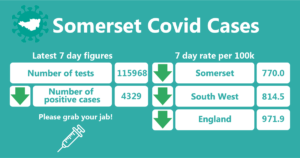Welcome to the latest edition of the weekly Somerset Covid-19 update for key stakeholders. This update is produced on behalf of the Somerset Covid-19 Engagement Board and is designed to provide a weekly update on the current Covid-19 situation in Somerset.
Covid-19 case numbers have decreased in the last week but remain high so the virus is still in circulation in Somerset.
This week, the PM announced the return to Plan A and the removal of Plan B regulations. Some rules have already changed as of 20 January with the rest due to change next week on 27 January.
Full details of the statement can be found on the GOV.uk website, and the updated guidance can also be found on the GOV.uk website.
To summarise, the main changes are:
- The government is no longer asking people to work from home if they can. People should now talk to their employers to agree arrangements to return to the office.
- From 20 January: Face coverings will no longer be advised for staff and pupils in secondary school and college classrooms.
- From 27 January: Face coverings will no longer be advised for staff and pupils in communal areas of secondary schools, nor for staff in communal areas of primaries. Directors of Public Health will only be able to recommend pupils and staff wear masks in communal areas in places where there are outbreaks or where the local public health situation justifies it, and with sign-off from the Education Secretary.
- From 27 January: There is no longer a legal requirement to wear a face covering. The government suggests you continue to wear a face covering in crowded and enclosed spaces
- From 27 January: Venues and events will no longer be required by law to check visitors’ NHS Covid Pass. The NHS Covid Pass can still be used on a voluntary basis.
However, these dates may be subject to change.
The vaccine remains our best line of defence, so please do step forward whether it’s for your first, second or booster jab. Full Somerset vaccination and booster information can be found on the NHS website. The majority of the people eligible for a booster vaccination have come forward, but while centres are still open, Somerset County Council (SCC) would encourage those remaining to make a booking.
Despite the move away from Plan B everyone should consider taking simple steps to help reduce the spread of Covid-19. So, even if fully vaccinated, everyone still needs to be cautious and keep each other safe. The main ways do this remain: wearing a well-fitting face-covering, meeting outside, ensuring there is good ventilation when meeting inside, keeping distance between people you meet, washing hands regularly and continuing to take lateral flow tests before meeting other people. Also, it is very important to report the results of all LFD tests online. If you have symptoms of Covid-19, please self-isolate and book a PCR test.
Latest Covid Dashboard: The following link below will take you to our website: Coronavirus (COVID-19) (somerset.gov.uk) Then scroll down the page until you get to ‘COVID-19 Dashboard’ in the list. Click on this and the dashboard will open.
‘Remember, everyone can catch it, anyone can spread it’.



| David Fothergill, Leader of Somerset County Council Twitter: @DJAFothergill | Trudi Grant, Director of Public Health Twitter: @SomersetDPH | Clare Paul, Cabinet Member for Public Health and Wellbeing Twitter: @Clarepaul_ |

In the week ending 16 January, approximately 115,968 tests were carried out across the county – this is down by around 20,000. There were with 4,329 new confirmed cases identified by these tests. The rates of Covid-19 remain high but have decreased in the last reporting week to 770 per 100,000. This is below both the South-West average and the national average.
Hospitalisation data for Somerset is around 68 Covid-19 in-patients in Somerset hospitals.
This Week’s Headlines:
The main items featured in this week’s update are:
- Workplace, Care and School settings
- Vaccinations Update
- Testing Update
- Latest Covid Catch-up film
- Resources and further information
Workplaces: From 19 January, employers have been able to start working towards employees returning to the workplace. As case numbers are still high the Government’s message to employers remains one of caution. Employers have a duty to protect the health, safety and welfare of their staff and customers and Covid-19 risk assessments will need to be reviewed in the light of the latest advice.
It is important to respect and be considerate of those who may wish to take a more cautious approach as restrictions are lifted. The following behaviours should be encouraged by staff to help protect themselves and reduce sickness absence:
- Meeting in well-ventilated areas where possible, such as outdoors or indoors with windows open.
- Wearing a well fitting face covering where you come into contact with people in enclosed and crowded spaces.
- Washing your hands with soap and water or using hand sanitiser regularly throughout the day.
- Covering your nose and mouth when you cough and sneeze.
- Staying at home if unwell, to reduce the risk of passing on other illnesses onto colleagues and others in your community.
- Considering individual risks, such as clinical vulnerabilities and vaccination status.
- Staff should be encouraged to continue to take rapid lateral flow tests in line with the guidance.
Rapid lateral flow coronavirus (Covid-19) tests – NHS
Businesses must not require a self-isolating employee to come to work and should make sure workers and customers who feel unwell do not attend the setting and take a PCR test.
Care Sector: Care settings continue to be affected with cases of Covid-19 and many settings have either single cases, clusters or outbreaks. On the whole, the infections seem to be having mainly mild symptoms.
SCC continue to work closely with our partners in Infection, Prevention and Control (IPC), the UK Health Security Agency (UKHSA) and Adult Social Care (ASC) to support:
- Vaccinations, ensuring boosters are provided and recorded on the Capacity Tracker
- High quality Infection, Prevention and Control measures, including good ventilation
- Identification, prompt action and reporting of cases of Covid-19 and other infections
Latest guideline updates: Supported living services during Covid-19 – updated 13 January 2022
- Confirmatory PCR test following positive lateral flow test is not required
Visiting arrangements in care homes – updated 13 January 2022 - Updated to reflect new national guidance on removal of confirmatory PCR tests following positive lateral flow test
- Omicron variant will be treated the same as the Alpha and Delta variants when managing outbreaks
Covid-19: management of staff and exposed patients or residents in health and social care settings – updated 17 January 2022 - Staff will be able to end their self-isolation period from the sixth day (after two negative LFD tests on days 5 and 6) but those tests must be taken at least 24 hours apart and they will continue to be required to meet additional conditions before returning to work, including undertaking daily LFD tests on day 7, 8, 9 and 10.
- If a staff member has returned to work after testing positive for Covid-19, they should resume routine LFD testing, even if this is within 90 days of the positive Covid-19 result.
Covid-19: infection prevention and control (IPC) updated 17 January 2022
Testing in care settings:
Testing supplies:
- All Care Quality Commission (CQC) registered care homes can apply for regular Covid-19 testing from NHS Test and Trace
- In an outbreak, if need additional stock – place an additional order by calling 119
- All issues with testing need to be reported to [email protected]
- Any urgent supply issues please contact [email protected]
Contact tracing:
- Please encourage staff to engage with contact tracing process if they test positive, either via the online form or via phone when they are called by either the national or local contact tracing team
Care staff mental health and wellbeing: SCC are encouraging care staff to maintain their wellbeing, model good self-care and be available to each other for everyday support and friendly conversation to support a culture of openness around good mental and emotional health. Find out more via the Somerset County Council (SCC) website. In addition, there are resources available to support our care sector during difficult times:
- Somerset Emotional Wellbeing Staff Hub – a dedicated online resource for all health and care workers in Somerset
- Our Frontline – mental health and bereavement support for care workers
- Somerset Mindline – open 24/7
Any questions? The Health Protection Team at UKHSA run a Q&A session for all care providers (care homes, domiciliary care, home care, supported and extra care living) at 3pm every Friday. These meetings are a useful opportunity to hear about all the latest developments and to answer questions from social care providers about preventing and managing Covid-19 cases and outbreaks. Please email [email protected] to be sent the invitation.
Schools and Early Years settings: Whilst SCC are currently seeing a small decline in covid case numbers, the rates are still very high, meaning there is still transmission occurring in the community. Changes that have been made in the past few weeks to national guidance, particularly the removal of the need for confirmatory PCR testing and ‘test to release’ self-isolation guidance, mean SCC are cautious about drawing a direct link between falling cases and falling rates of infection in our community. Testing data over the next two weeks will provide more information.
Earlier estimates suggested that absence among the workforce may have reached 20-25% at the peak of cases. Thankfully, SCC have not seen the large number of staff absences that they were originally preparing for and whilst Covid case numbers in schools remain high, attendance rates in our schools are currently at over 90% – higher than the regional average.
Throughout the pandemic, our education staff have consistently met the challenges covid continues to create all whilst balancing the educational needs of our children and young people. This high level of capability and competence gives us confidence in your ability to continue to manage the impact of covid cases in schools, early years settings and colleges. The SCC Public Health Team recognise the challenges still present but assure all in our education systems that SCC are seeing all schools confidently using amber measures in the right way.
Recent announcements: Government announcements on 19 January removed the requirements for staff and pupils to wear face covering in the classroom from 20 January. Face masks are still required to be worn in communal areas and when moving around the school until 27 January. The contingency framework for education is expected to be updated on 20 January. Please keep other existing measures in place until further notice. The regional consensus statement position is being reviewed in light of these announcements and SCC will communicate changes next week. You will appreciate this is a changing landscape and that SCC don’t have the full details yet. They will communicate these as soon as they go through the usual channels.
Access to LFDs for Primary School: Primary school students and parents can continue to access tests via community routes (collection at local participating pharmacy) or via the online ordering service.
Contact Tracing for Under 18s: Since 6 January, parents/guardians of children aged 18 or under who test positive for covid can now complete their child’s NHS Test and Trace form online as a proxy. This change was brought in to provide more flexibility and convenience to parents/guardians.
The instructions and link to access this will be sent directly to them after their child’s positive test result has been reported. The option to complete contact tracing online also provides the opportunity for more information to be added to the form later, when further contact details for example, may be more readily available.
The Public Health team at Somerset County Council are strongly encouraging parents/guardians of child cases of COVID-19 to complete their child’s NHS Test and Trace form online, as soon as they are able to do so.
Childhood Immunisation Programme: The Somerset Foundation Trust manage the childhood immunisation programme with SAINT (School Age Immunisation Nursing Team, part of the NHS). SAINT deliver the nasal flu vaccination to all schools in Somerset.
All schools that were cancelled prior to Christmas due to team redeployment have now been rebooked and SAINT aim to complete the school flu programme delivery by the end of January.
Appointment only FLU clinics: To attend a clinic that requires an appointment please email [email protected]
Flu vaccination programme – SAINTS (School Age Immunisation Teams)
The following walk in flu clinics are available:
- West Mendip Community Hospital (Outpatients) Old Wells Road, Glastonbury, BA6 8JD – 5th February 2022, 9:30am – 11:30am
- Westlands Entertainment Venue, Westbourne Close, Yeovil, BA20 2DD – 5th February, 1:30pm – 3:30pm
- The Families Hub, Level 2, East Reach House, Taunton, TA1 3EN, 9am – 12pm
There are new clinics starting regularly in other areas in the coming weeks. Please encourage parents/guardians to check the NHS walk in site for up to date information.
The School Aged Immunisation Nursing Team (SAINT) will be delivering second doses for secondary aged children 12 weeks after their first dose. As per the first jab, this programme will be delivered through schools. Schools will be contacted directly with further information. There is a continued offer for all eligible young people to access their first dose via vaccination sites in Somerset for those who may have missed their school session.
Bookings can be made through the National Booking Service online or by calling 119.
Parents and Guardians can also access second jabs for 12-15 year olds via the booking system and at some of the walk in clinics. There are plenty of slots available via the booking system at clinics across Somerset.
- Haynes Motor Museum: Monday – Friday, 9am – 5pm, Sparkford, Yeovil, BA22 7LH
- Firepool, Taunton: Monday – Sunday, 9am – 5pm, Canal Road, Taunton, TA1 1NY
- Bridgwater Town Hall: Fridays in January, 9am – 5pm, High Street, Bridgwater, TA6 3LS
- Cheese and Grain: Saturday 15th January, 10am – 5pm, Market Yard, Justice Lane, Frome, BA11 1BE
- Alfred Gillett Trust, Clarks Village, Sunday 16th January, 10am – 4pm, The Grange, Farm Road, Street, BA16 0BQ (Access via Grange Car Park 2 then follow the path to the right-hand side of Clarks Village Entrance).
- Dillington House: Weekly from Wednesday 19th January & Thursday 20th January, 12pm – 8pm, Illminster, TA19 9DT
- Wellington Community Hospital: Friday 21st January, 9am – 5pm, Bulford Lane, Wellington, TA21 8QQ
Please note: If a child has tested positive for Covid-19 and is not at high risk from Covid-19, they need to wait 12 weeks before they can have a Covid-19 vaccine. This starts from the date they had symptoms, or the date of the positive test if they did not have symptoms
Vaccination Update: Following the success of the pre-Christmas surge vaccination campaign, SCC will continue with the general public offering as described below and the Vaccination Programme will be focussing more vaccination resources on areas or population groupings of lower vaccine uptake.
In terms of booking vaccinations this should continue to be done via the NHS website this gives local information but also leads into the National Booking Service. Depending on your location, circumstances and availability this system will then show you when and where there are available appointments for vaccination. This may or may not be within Somerset but will give the best options available for vaccination as quickly as possible.
To get your vaccine visit the NHS website or call 119 for an appointment. There are also convenient walk-in options across the country, which you can also find on the NHS website.
Currently there is a lot of spare capacity at vaccination sites and locations so there is plenty of choice and opportunity to get vaccinated. The overall aim to vaccinate 95% of the general eligible population still remains and particularly the younger age groups are being asked to consider vaccination if they have already not done so.
Testing Update: From 17 January, people with Covid-19 have been able to take an LFD test on the fifth and sixth days of their isolation period. If both LFD test results are negative, and they do not have a high temperature, they will be able to end their self-isolation after the second negative test result, after five full days of isolation. The LFD tests must be taken on consecutive days, but the guidance will no longer state these tests should be taken at least 24 hours apart. There is separate guidance for those working in health and social care settings.
This change to the isolation period applies only to positive cases. The self-isolation period remains 10 days for unvaccinated adult contacts to reflect their infectious period post contact (contacts who are fully vaccinated or under 18 are not legally required to self-isolate but are advised to take daily LFD tests for 7 days).
LFD testing and reporting: SCC would like to remind people to please follow the Instructions for Use for the relevant type of LFD test kit when testing. There are some test kits which require only a nasal swab, and others which require a nasal and throat swab – results may be inaccurate if the incorrect technique is followed. SCC would also like to encourage everyone who tests using an LFD kit to report their results online – whether positive, negative, or void. This not only helps us to identify positive individuals to help contain further transmission, but it also informs what the demand currently is, so they have adequate supplies in Somerset.
National Programme of Precautionary testing for critical workers: Lateral flow tests have been directly sent to the workplaces of 100,000 critical workers in England. Critical workers will be able to take a test on every working day and the provision of precautionary testing will be for an initial 5 weeks. This will help to keep essential services and supply chains running. Roll out started from Monday 10 January.
These critical workers are those who:
- work in essential services
- cannot work from home
- may be at risk of spreading the virus (for example, due to working together in an enclosed space)
- do not already have access to a separate testing regime, and
- have been identified as being in priority, specialist roles
People covered by the scheme will include those who work in critical national infrastructure, national security, transport, and food distribution and processing. This includes vital roles in Border Force, Police and Fire and Rescue Services control rooms, electricity generation, test kit warehouses and test labs.
Workers in other sectors (including those in critical workforces not listed above) can continue to order them online. Alternatively, people may prefer to pick up tests from a local pharmacy or collection point. People working in certain workplaces, such as health and social care settings (NHS, adult social care) and education (teaching staff) settings, can access testing through their employers and should continue to follow testing guidance for those settings. Everyone should continue to test in line with government guidance and their employers’ advice.
Since the 6 January, parents/guardians of children aged 18 or under who test positive for Covid-19 have been able to complete their child’s NHS Test and Trace form online as a proxy. The instructions and link to be able to do this will be sent directly to them after their child’s positive test result has been reported. This change was brought in to provide more flexibility and convenience to parents/guardians. The option to complete contact tracing online also provides the opportunity for more information to be added to the form at a later date, when contact details for example, may not be immediately available. The Public Health team at SCC are strongly encouraging parents/guardians of child cases of Covid-19 to complete their child’s NHS Test and Trace form online, as soon as they are able to do so.
Covid Catch-up Film: This week Clinton discusses the importance of vaccinations for pregnant women and clarifies their safety with the help of a midwife. The film can be viewed on YouTube.
The Covid-19 vaccine has been proven to be safe for women at any stage of pregnancy, and for anyone who is breast-feeding and is the best protection against the risks of Covid-19 for pregnant women and their babies. The vaccine can also reduce the risk of admission to hospital and premature birth.
Resources and further information: Please do keep an eye our Healthy Somerset website, which has a huge amount of information and resources to help keep everyone healthy happy and safe at this time.
For the latest local information as well as digital resources, posters and flyers please visit the Somerset County Council website.
The Somerset Local Outbreak Management Plan outlines how SCC, the council, will work with the NHS Test and Trace Service, PHE, the NHS and other partners to ensure a whole system approach to preventing and managing local outbreaks. This can be found here.
Finally, please like them on Facebook, follow them on Twitter and share their posts with your networks to help them in communicating these important messages. Follow their Director of Public Health Twitter account too.

